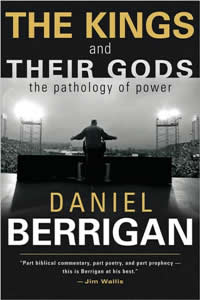Book Notes
 Daniel Berrigan, The Kings and Their Gods; The Pathology of Power (Grand Rapids: Eerdmans, 2008), 202pp.
Daniel Berrigan, The Kings and Their Gods; The Pathology of Power (Grand Rapids: Eerdmans, 2008), 202pp.
In her memoir Things Seen and Unseen, Nora Gallagher recalls meeting Daniel Berrigan (b. 1921) in the spring of 1986. When she asked how many times he had been jailed, he responded, "Not enough." Poet, playwright, peace activist, and Jesuit priest, Daniel Berrigan has spent a long life obeying the good news of Jesus rather than the bad news of caesar. He and his brother Philip did time on the FBI's Ten Most Wanted list. In 1968 he and eight other activists stole 378 draft files of young men who were about to be sent packing to Vietnam, dumped them into two garbage cans, poured homemade napalm on them, and burned them in the parking lot of the Catonsville, Maryland, draft board. In 1980, he trespassed into General Electric's nuclear missile plant in King of Prussia, Pennsylvania, poured blood on some warhead nose cones, then hammered away to punctuate his prophetic point.
Now eighty-seven, age has not extinguished Berrigan's fire. Death row, smart bombs, Iraq, and what he calls "abortion mills" still provoke his ire. These meditations reflect on the books of 1–2 Kings and, as you would expect, draw parallels to our own pathologies of political power today. How should we read these ancient texts about a territorial god who slaughtered his pagan enemies? In what sense are these pages inspired?
Berrigan reads 1–2 Kings as self-serving imperial records that portray Israel's kings as they saw themselves and wanted others to see them — God is with us and against our enemies. He blesses us with their booty. No war crime is too heinous as a means to these delusional ends. And so on page after page we see hell explode on earth. There is one political end: extra imperium nulla salus, "outside the empire there is no salvation." There are many pathological means to this end: untrammeled imperial ego, political power with absolute impunity, military might, revisionist history, manipulation of memory and time, grandiose building projects, economic exploitation, virulent nationalism, and, sanctioning it all with divine approval, religious legitimation. In 1–2 Kings, says Berrigan, the Bible is thus "deconstructing" itself; "the medium itself is the message." A few dissenting voices object to imperial power, but they are silenced as unpatriotic and seditious. Only with the eighth-century prophets are these "official" texts amended so that we see and hear the real perspective of Yahweh about justice, kindness, and humility for all peoples everywhere.
1–2 Kings also function as mirrors in which we see our own reflection today. "Do our leaders differ, in any large degree, from the rulers of old? They are hardly different at all." Drawing upon the poetry of Czeslaw Milosz, letters from his friend Thomas Merton, and revealing snippets from the NY Times, Berrigan joins the hermeneutical horizons of ancient text and contemporary context. The last word on his final page? "One must urge (to his own soul first) a firm rebutting midrash; bring Christ to bear. Read the gospel closely, obediently. Welcome no enticements, no other claim on conscience. Mourn the preachers and priests whose silence and collusion signal plain revolt against the gospel. Enter the maelstrom, the wilderness; flee the claim that would possess your soul. Earn the blessing; pay up. Blessed — and lonely and powerless and intent on the Master — and, if must be, despised, scorned, locked up — blessed are the makers of peace."


